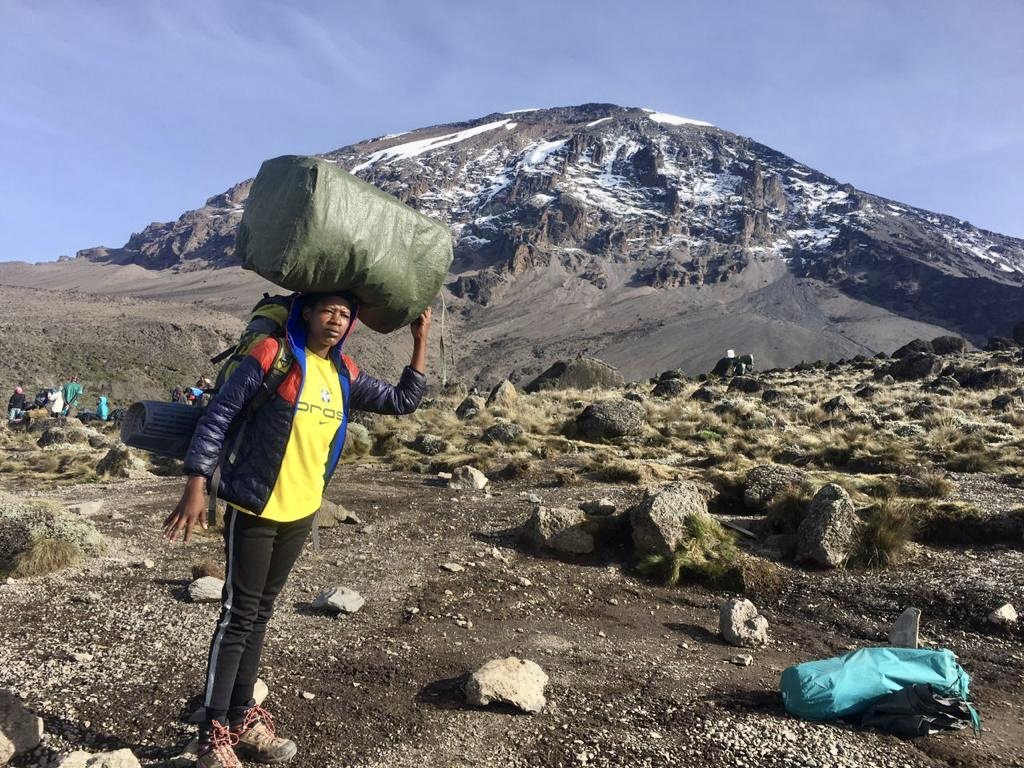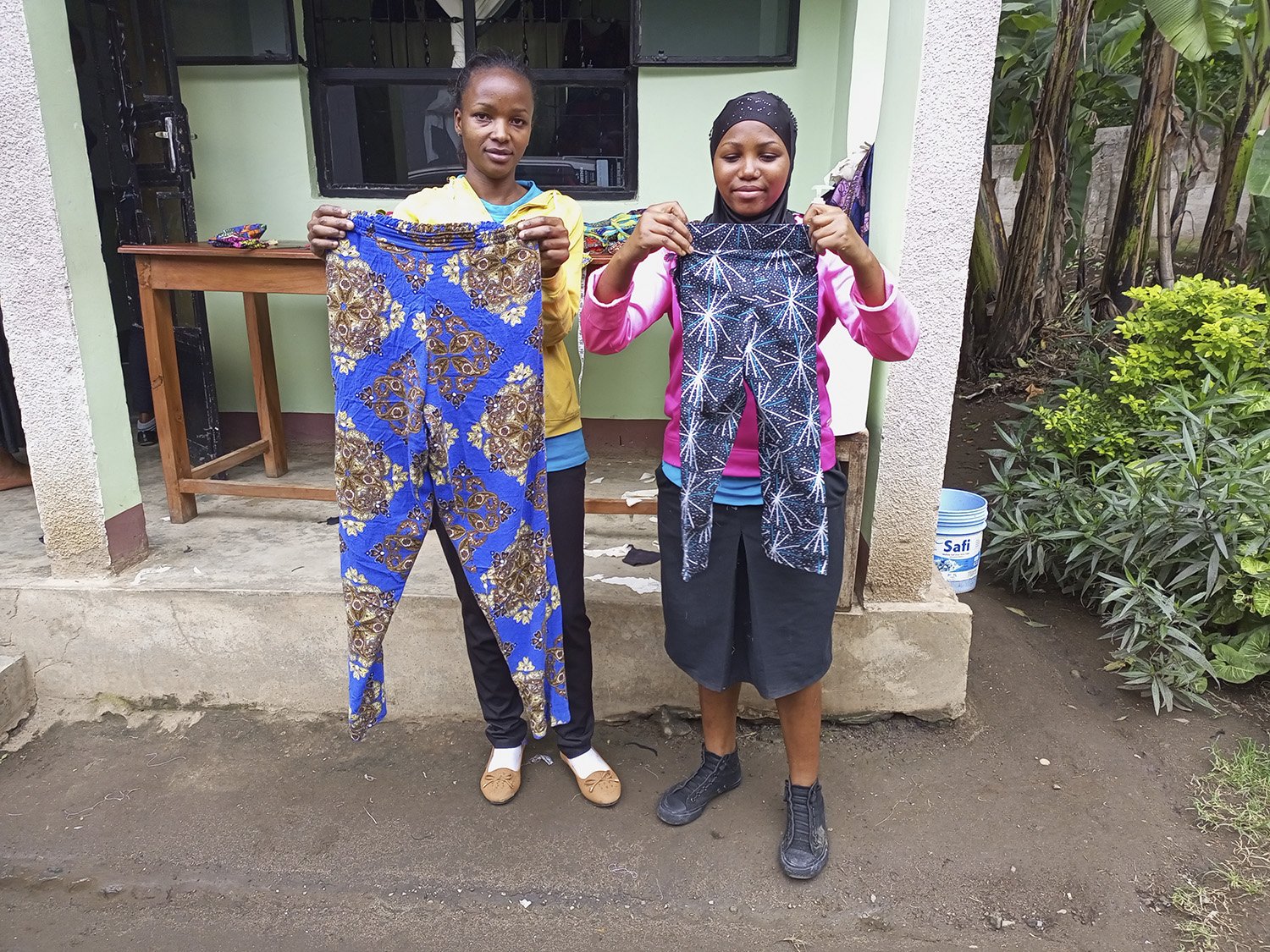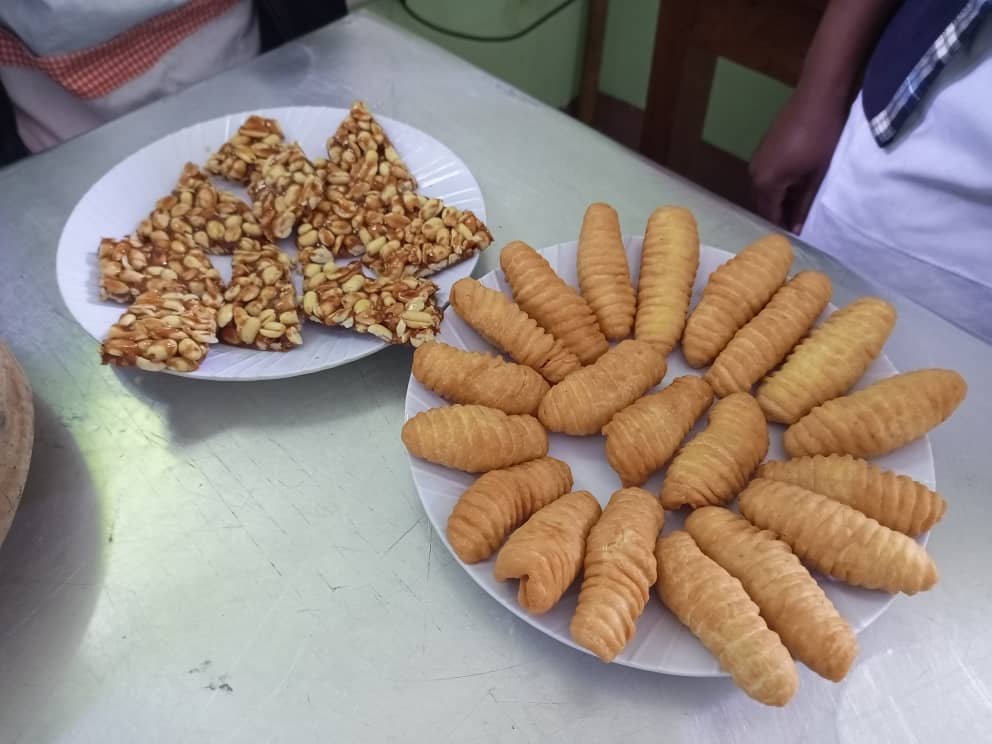The Inuka Tusonge Foundation
Inuka Tusonge is Swahili for ‘Stand up and move forward’.
-

Partnership
Beatrice Lyimo, a founding Director of the Inuka Tusonge Foundation taught Dianna Snape Swahili in 2013 and their friendship, respect and ideals have been shared ever since. Beatrice holds a Bachelor of Education with an English Major and History Minor from the University of Arusha (Tanzania) and supports herself and her two young children working as a Swahili Language teacher.
With a loan from a local women’s association, The Inuka Tusonge Foundation was established in January 2020 by Beatrice, Levina and Gudila, three tertiary-educated Tanzanian women who identified a gap in education provision for vulnerable women and girls in the Arumeru District. The centre’s main purpose is to help the students acquire valuable life skills and improve their overall employability through skills-based training in areas such as hairdressing and beauty services, baking, tailoring and vegetable cultivation. Beatrice reached out to Dianna for funding to support the on-going operations and equipment needed to keep the centre viable.
The Inuka Tusonge Foundation is registered as a charity in Tanzania (00NGO/R/0897) and the centre is managed by founding Director Beatrice Lyimo.
Shoring up empowerment and independence for vulnerable women, is ultimately what lies at the heart of Nina Imani’s ongoing partnership with the Inuka Tusonge Foundation.
The centre’s on-going operations are fully funded by Nina Imani, we provide governance support for best practice, review fiscal reporting and foster outcomes.
-

Training
Inuka Tusonge’s vocational centre provides skills-based training in areas such as hairdressing and beauty services, baking, tailoring and vegetable cultivation.
Supplementary education aims to foster entrepreneurial potential and build individual capacity by developing English-language skills, broader personal and social competencies, as well as business planning and employability skills.
Through providing students with knowledge and resources to develop their own small businesses or enterprises across a range of industries, the goal is to foster entrepreneurial and business management skills as well as technical skills to ensure that the young women can maintain employment and establish financial independence.
Along with the monetary benefits of financial independence, it is crucial to developing a positive self-image and sense of capability. This empowerment and development of individual capabilities in vulnerable girls and young women is a core focus of the Inuka Tuonge Foundation. Women who are empowered through the fostering of employability skills and paid work are more likely to become positive role-models and advocates for their families and communities, especially on issues of health and well-being, gender inequalities and human rights
Students are selected in consultation with village leaders to identify young women most in need as well as those motivated to engage and change their circumstances.
Courses run for 12 months, 5 days per week, complimented with a 3 month field study working with local hotels and employers to give students practical insights into a workplace environment. Students are provided a healthy lunch and reusable period underwear. A graduation ceremony is held at the completion of the course for students who meet the attendance requirements and successfully master the skills taught.
-
Mentoring
Designed to help graduates transition from the classroom to the workforce, the Inuka Tusonge Foundation’s mentoring program helps former students identify how their new skills might be utilised to secure their future financial independence and security.
Graduates don’t just acquire skills, they form a valuable support network and establish new friendships.
Graduates have gone on to start their own small businesses cooking Bagia and Mandazi. Others have been employed in hospitality, as tailors, hairdressers, and as porters on Mt Kilimanjaro through our partnership with Akila Africa.
Arumeru District
The Arumeru district lies on the slopes of Mt Meru in Tanzania and is one of seven district councils found in the Arusha Region. With around 63% of its land used for agriculture, Meru is largely a rural area, and as of 2017, is estimated to have a population of around 306,353 people.
Only 3.4% of children have more than seven years education, and a further 35.5% of people don’t have access to clean water.
Educational Sponsorship
-

Joackim
Joackim is a proud Maasai boy from a remote Maasai community in NAINOKANOKA Village in the Ngorongoro Highlands.
He lost his father in an accident and his mother is struggling to take of him and provide basic needs. Nina Imani provides ongoing support to enable Joackim to begin his education at Costigan Primary School in Karatu.
Having completed 12 months of schooling he will begin his second year of education in 2024 with outstanding reports from 2023.
Many thanks to Meliji our project coordinator who advocates and volunteers his time to facilitate the program.
-
Kayonet
Kayonet is also from NAINOKANOKA village in the Ngorongoro Highlands and is the last born of 3 children.
Her father passed away during COVID and her mother struggles to take care of the children. She started a small business selling maize with a loan from VICOBA and an affordable interest rate.
She has been unable to afford school fees and materials and is very grateful for the opportunity to get funding to send Kayonet to school.
-
Lilian
Nina Imani supported Lilian with a study grant to undertake a part-time, 12-month tour guiding course at Sila College in Arusha to improve her opportunities to generate work and income. This funding included important basics such as tuition, uniforms, books and safe transport to and from college.
From March to June 2021, Lilian completed a three-month unpaid work placement in the Ngorongoro Conservation Area as part of her course at Sila College. Nina Imani funded Lilian's costs during work placement including a small monthly stipend so she could continue her support for her family through this life transition.
With the support of Nina Imani, in September 2021 Lilian enrolled in a further six-month Hotel Management course at SILA College to further expand her employment opportunities in the Arusha region.
Through SILA College she was chosen for a traineeship at the Four Points by Sheraton Arusha and trained there while she completed the second semester of her Hotel Management course.
Nina Imani also supported Lilian to get her Drivers licence and first aid certificate.
Lilian is continuing to look for work in the tourism sector and provide Nannying services to a family while she keeps looking.
Outcomes
-

453 Days of learning
The Inuka Tusonge Vocational Centre programme includes skills-based training in food preparation, cooking and baking, vegetable cultivation, hairdressing and beauty treatment and tailoring.
Supplementary education focuses on entrepreneurship, English-language skills and business plan writing.
Each program runs for six months Monday to Friday.
-
5 Jobs created
The Inuka Tusonge Foundation employ 5 paid staff, including 4 teachers and 1 office administrator.
Students from the course are are employed as an office administrator and receive computer training from Director Gudila.
-
9 Guest Presenters
Guest presenters include; ,
Doctors, Nutritionists, Government representatives, Entrepreneurs, Past Graduates, Porters and female role models.
-

2 Vegetable gardens cultivated
The centre has a small yard that facilitates green vegetable cultivation. Crops are planted and harvested by the students and the vegetables used in the cooking classes and for the students to take home.
The garden has produced african spinach, chineese, sukuma, week bitter tomatoes and mnafu (a popular green vegetable often sautéed with chicken or pork, eaten with Ugali.)
-

Healthy lunches every day
Students are provided a healthy lunch each day. Some of the students struggle to secure food for meals each day due to their financial circumstances, so it is important they have basic nutrition in order to learn.
-

Young entrepreneurs training
Training is targeted at helping students understand the meaning of entrepreneurship. The weekly sessions focus on enabling students to evaluate themselves and identify their strengths/weakness and those of each other.
Training encompasses time management, business management, business plans, costing/pricing, supply & demand, profit & loss, customer care & marketing.
Sessions are run by weekly by Mathayo Laizer.
-

Menstrual hygiene products
Students are provided with reusable menstrual hygiene products sourced from a local Tanzanian woman making these products.
-

Entrepreneur exhibition
Nina Imani funded an excursion for the Inuka Tusonge students to attend an exhibit of small collectives, showcasing female entrepreneurs.
They saw demonstrations on how to print clothes and make labels, make baskets & Masaai Jewellery, as well as making shampoos and soaps.
-

TARI Symposium
In September 2021 Inuka Tusgone was invited by the Tanzanian Agriculture Research Institute (TARI) to host a 2 day Symposium teaching agriculture bean farming practices covering seed choice, storage and nutritious meals. This was complimented by a small entrepreneur mentorship session discussing small business, challenges and regulations.
-

TCDC Training Institute
To support the cooking and hospitality component of the vocational training the students visited the TCDC training institute to observe how a commercial kitchen operates. The tour included demonstrations of how to make different kinds of coffee, arrange a table in a hotel dining room, as well as variety of glasses and their uses.
-

27 Graduates
Upon graduation students are invited to participate in further mentoring. Designed to help graduates transition from the classroom to the workforce, the Inuka Tusonge Foundation’s mentoring program helps former students identify how their new skills might be utilised to secure their future financial independence and security.
Graduates have gone on to establish small businesses in cooking. Others have obtained gainful employment in tailoring and hairdressing based on the skills they gained during their 6 month training and references from Inuka Tusonge Directors.
-
1 College graduate
In 2020 Nina Imani funded a study grant for Lilian Kagaruki to undertake a part-time, 12-month tour guiding course at SILA College in Arusha. Funding included tuition, uniforms, books and safe transport.
We supported her participation in two field group studies, one to the Ngorongoro Conservation Reserve and the other to Manyara National Park. We also supported her 3 month work placement in the Ngorongoro Conservation Area in the first quarter of 2021. Lilian successfully graduated in 2021 and we are now supporting Lilian’s further study in Hotel Management to broaden her employment opportunities.
-

1 Traineeship
Through her study at SILA College Lilian was chosen at the end of 2021 to undertake a traineeship at the Four Points by Sheraton Hotel in Arusha.
-
2 Small businesses
Graduates Merline & Loveness graduated in March 2021 and have started small businesses making Mandazi and Bagia to sell in their neighbourhoods. Inuka Tusonge Directors visit to check on their progress and any provide support and encouragement.
A micro-finance loan was provided to Loveness to help her start. She is repaying this loan.
-
1 Graduate employed - Hairdressing
As well as starting a small business making Mandazi, Loveness supports her income with a paid job in a salon braiding hair.
-
1 Graduate employed - Restaurant
Jackline graduated from the vocational program in October 2021 and is now employed in the kitchen at Uzunguni Park in Arusha.
-

1 Graduate employed - Porter
Diana graduated from the vocational program in October 2021 and through our partnership with Alika Africa was offered the opportunity for paid employment on a Kilimanjaro climb. Diana did amazingly well supported by an incredible crew.
-

328 Bagia
This dish originated from the Kenyan coastal region but has become one of the more popular dishes in Tanzania. Thinly cut potatoes are coated in a paste made from wheat flour mixed with spices such as ginger, scallions and green onions. The potatoes are then deep-fried.
-

151 Bread rolls
-

127 Kalmat
Kalmat is a form of soft fried bread that originated on the Swahili Coast
-

101 Chapatis
East African Chapati is a beautiful unleavened flat Bread that has a delicious but subtle flavour that can be easily paired with almost any dish whether sweet or savory making it an extremely versatile side dish staple.
-

98 Samosa
-

36 Chef Sticks
-

32 Bean balls
-

20 Vegetable Rice
-

12 Fish & Rice
-

12 Pilau
Pilau (pronounced “pih-LAU”) means “rice” and is cooked in stock with spices and a bit of butter.
-

10 Banana Stew
-

10 Loaves of bread baked
Often in the morning Tanzanian’s will drink a cup of chai paired with some bread. Common choices are typical white bread, a chapati, or a mandazi, which is a slightly sweet deep-fried square of dough.
-
9 Soups
-
5 Omelettes
-

4 Burgers | 2 Pizza
Description goes here -

1 Kg Popcorn
-

337 Doughnuts & Mandazi
The students have fried and baked a combination of Mandazi (East African doughnuts) and deep-fried hard doughnuts.
-

150 Biscuits
Description goes here -

125 Cakes & Cupcakes
Just like the rest of the world, the people of Tanzania also love cake, and it is one of their favorite desserts, often even used for religious and cultural ceremonies.
-

92 Kashata
Kashata is a unique traditional African candy made from roasted peanut or dried coconut. Influenced by the Persians during the trade era, coffee and kashata have become a firm fixture on the Tanzanian coast.
-
46 Croissants
-

21 Pancakes
-
20 Vishet
-

19 Scones
-
15 Danish Pastries
-

81 Dresses
Description goes here -

39 Aprons
-

36 Trousers
Description goes here -

34 Skirts
-

30 Kitchen Hats
-

25 Shirts
-

22 Blouses
-

16 Wallets
-

6 Bags
-

6 Mats
Left over fabric is saved to make mats so that no material goes to waste
-

6 Pillows
-

6 Baby underwear
-

4 Curtains
-

443 Hair braids & extensions
-

37 Wash, set & blowdry
-

90 Faces of make up
Equipment Purchased
-

6 Sewing machines
-

1 Iron
-

1 Oven
-

Cooking Equipment
Plates, Frying Pan, Cooking Pan & Cups
-

Hand mixer
-

Thermos
-

1 Charcoal stove
-

Metal for Cooking Table
-

2 Hair dryer's & rollers
-
1 Whiteboard
-

Office desk & computer
-

Shelves
-

Safe
-

Learning table
-

Printer
-

22 Plastic chairs
-

Bin | Storage | Iron | Dustpan
-

Salon Stand
-

Shelving
















